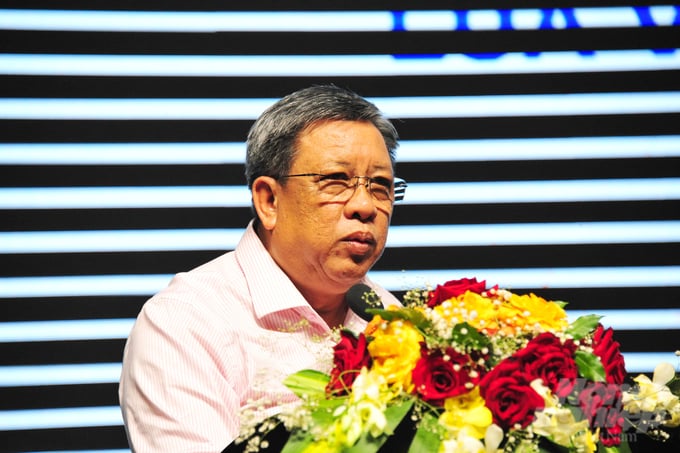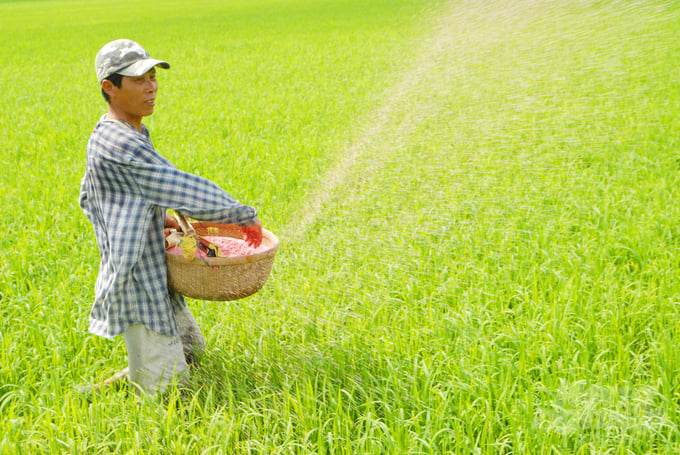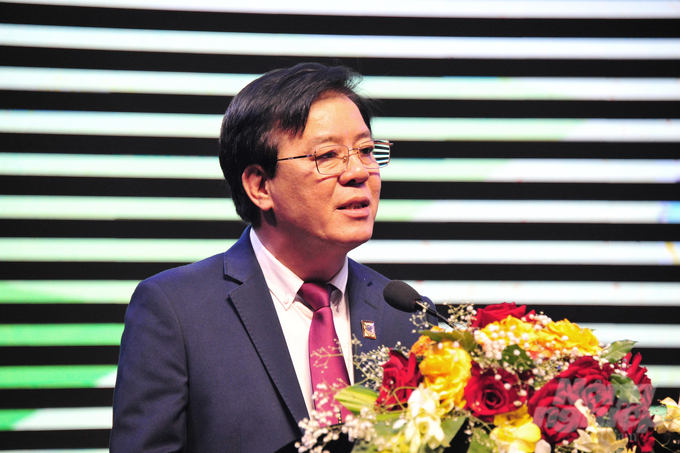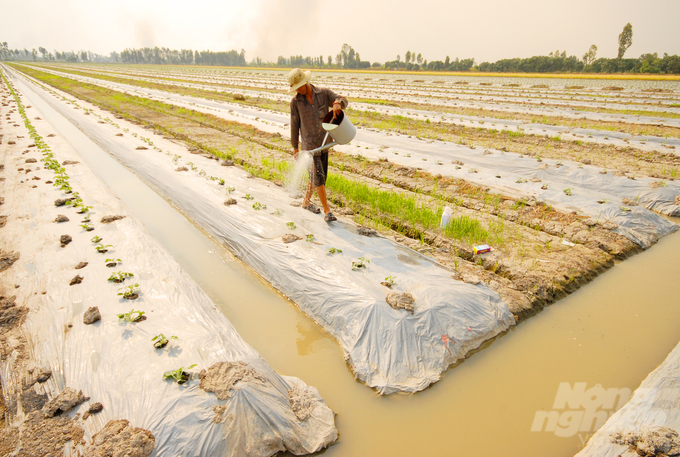May 23, 2025 | 12:27 GMT +7
May 23, 2025 | 12:27 GMT +7
Hotline: 0913.378.918
May 23, 2025 | 12:27 GMT +7
Hotline: 0913.378.918
The Department of Crop Production (Ministry of Agriculture and Rural Development) recently collaborated with the Vietnam Rice Sector Association (VIETRISA) and Binh Dien Fertilizer Joint Stock Company to organize the first 2024 National Conference on "Soil and Fertilizer" in Can Tho City. The theme of the event was "Fertility Status of Rice Soil in the Mekong Delta and Solutions to Enhance Fertilizer Efficiency in Rice Cultivation."
The conference aimed to assess the fertility status of paddy soil in the Mekong Delta over the last five years. Accordingly, it will identify limitations in the local soil environment and propose solutions to improve fertilizer efficiency, reduce costs, increase farmers' incomes, and lower greenhouse gas emissions.

Le Thanh Tung, Deputy Director of the Department of Crop Production, remarked that the rise of intensive farming practices, increased crop cycles, and unbalanced and unregulated use of inorganic fertilizers have disrupted the soil's nutrient balance, affecting its physical, chemical, and biological properties. Photo: Le Hoang Vu.
Deputy Director Le Thanh Tung further noted that with over 3 million hectares of rice production area every year, the Mekong Delta contributes 50% of the country's total rice yield and 90% of rice exports. However, this region is expected to face significant challenges in the near future. Paddy soils in the Mekong Delta are currently experiencing nutrient imbalances due to unregulated usage. The rise of intensive farming practices, increased crop cycles, and unbalanced and unregulated use of inorganic fertilizers have disrupted the soil's nutrient balance, affecting its physical, chemical, and biological properties.
At present, paddy soils in the Mekong Delta are divided into three distinct ecological zones, with coastal areas showing a concerning calcium-to-magnesium (Ca/Mg) ratio (lower than 1), which indicates a severe nutrient imbalance. Additionally, all three zones have acidic soils with pH levels ranging from 5.0 to below 5.5, whereas the optimal pH range for healthy rice growth typically falls between 5.5 and 6.5.
Located at the lower end of the Mekong River, the Mekong Delta region is one of the global centers for climate change. In addition to extreme weather events such as prolonged droughts, the region, bordered by the East Sea and the West Sea with over 700 kilometers of coastline, faces urgent climate-related challenges, including rising sea levels and increasingly severe saltwater intrusion. These factors directly affect soil properties, impacting rice yields and the livelihoods of local farmers.

The unscientific use of fertilizers, leading to waste and soil pollution, remains a common issue in the Mekong Delta region. Photo: Le Hoang Vu.
Pressure from intensive rice farming and increased crop cycles has resulted in the unscientific use of fertilizers, which further exacerbates the soil degradation process in the Mekong Delta. With three rice crops per year, farmers in areas such as Dong Thap and An Giang were forced to increase fertilizer use over time with the aim of maintaining yields, causing both waste and environmental pollution.
Deputy Director Tung highlighted that paddy soils in the Mekong Delta region are becoming increasingly infertile. One contributing factor is the practice of burning rice straw directly on fields or burying straw after harvest without appropriate treatment. The practice of rice straw burning wastes resources, pollutes the environment, and depletes soil nutrients. Frequent and prolonged straw burning can lead to rapid soil degradation, which makes it compact and less fertile. Additionally, burying untreated rice straw in waterlogged fields negatively impacts soil organic matter, causing organic poisoning in rice plants and producing significant greenhouse gases.
Dong Thap Province is the third-largest rice producer in the Mekong Delta region, following Kien Giang and An Giang. The province has a total agricultural land area of 255,005 hectares, with 195,229 hectares dedicated to rice cultivation, accounting for 76.6%. Approximately 68% of the rice-producing area houses three crops every year, while the remaining 32% houses two crops. Dong Thap's rice-producing land fund has continued to shrink in recent years due to crop restructuring and land repurposing for non-agricultural uses.

Ngo Van Dong, General Director of Binh Dien Fertilizer Joint Stock Company, stated that improving fertilizer efficiency in rice cultivation constitutes a smart farming process that promote green growth and low emissions in the Mekong Delta. Photo: Le Hoang Vu.
During the summer-autumn 2024 crop, models under the "one million hectares of high-quality rice" project, implemented in various production areas across the Mekong Delta, demonstrated that applying precise sowing techniques in combination with fertilizer application and the integration of modern technologies resulted in yields of 7.2 tons per hectare, surpassing non-model fields by over 0.3 tons per hectare. This approach helped farmers reduce investment costs by over 4.2 million VND per hectare, while profits increased by 5.4 million VND per hectare. Emission levels also saw significant drops compared to non-model fields managed with traditional cultivation practices.
Additionally, Binh Dien Fertilizer Joint Stock Company provided a report on the research and development of the Dau Trau Bio product line, designed to address several issues affecting Mekong Delta paddy soils, such as acidity, saltwater intrusion, and organic poisoning. The company has implemented these models in several provinces, including Long An, Soc Trang, Dong Thap, Binh Dinh, and Tay Ninh.
Accordingly, the company implemented these demonstration models on different types of soil and ecological regions, resulting in varying fertilizer application processes. Rice yields increased by 0.2 to 0.8 tons per hectare compared to control fields, while profits rose by 1.1 to 5.2 million VND per hectare.
Dong Thap Province features four main soil groups: alluvial soil, accounting for over 59% of the province's natural land area, distributed across 10 districts and cities (except Tan Hong District); acid sulfate soil, accounting for nearly 26%, distributed across 10 districts and cities (except Cao Lanh City); gray soil, accounting for 8.67%, distributed across the higher areas of Tan Hong and Hong Ngu districts; and sandy soil, accounting for 0.04%, distributed across Dong Cat and Go Thap (Thap Muoi District).

Soil is the foundation for crop production, providing essential nutrients and water for plant growth and development. Photo: Le Hoang Vu.
Dong Thap's agricultural sector has effectively implemented numerous programs, projects, and models over the years to improve the quality of agricultural soil, particularly paddy soil. As an alternative to chemical fertilizers and agricultural chemicals, these initiatives employ advanced methods, including the use of organic fertilizers, microbial fertilizers, and biological plant protection products, as well as sustainable farming and safe and organic vegetable production practices. Consequently, the province has utilized its agricultural land with increased efficiency, contributing significantly to soil improvement and enhancing its quality, thereby increasing the economic value of the local production areas.
General Director Ngo Van Dong reported that the application of smart farming methods, in association with green growth and low-emission practices in the Mekong Delta, has successfully increased fertilizer efficiency in rice cultivation. This achievement is evident in the summer-autumn 2024 crop under the "Sustainable Development Project for one million hectares of specialized, low-emission, high-quality rice in association with green growth in the Mekong Delta region by 2030."
Key measures include reducing seed rates (to below 80 kilograms per hectare) and utilizing advanced technology for rice cultivation, such as row or cluster sowing, to lower seed usage while promoting yield. The alternate wetting and drying irrigation method is critical for reducing emissions in the fields by encouraging root growth and minimizing lodging. Additionally, farmers are encouraged to repurpose post-harvest straw fo
Soil supports the growth of plants by providing essential nutrients and water. Consequently, healthy crop development require a strong soil environment. Sustainable rice farming requires farmers to prioritize maintaining the quality of the soil.
r other uses as an alternative to burning.
Translated by Nguyen Hai Long

(VAN) The People's Committee of Tra Vinh province has approved an adjustment to the investment policy for the Green Hydrogen Plant project, increasing its area to approximately 52.76 hectares.
![Reducing emissions from rice fields: [2] Farmers’ commitment to the soil](https://t.ex-cdn.com/nongnghiepmoitruong.vn/608w/files/news/2025/05/05/dsc08881jpg-nongnghiep-140632.jpg)
(VAN) Clean rice cultivation model in Thuong Tan commune, Bac Tan Uyen district, is assisting local residents in achieving sustainable agriculture by substantially reducing costs, increasing productivity, and protecting the environment.

(VAN) At the conference to disseminate Resolution No. 68, AgriS introduced its digital agricultural ecosystem and reaffirmed its commitment to accompanying the Government in promoting private sector development and sustainable agriculture.

(VAN) 'Blue Ocean - Blue Foods' initiative is designed to restore marine ecosystems and establish sustainable livelihoods for local communities by cultivating a minimum of 1,000 hectares of cottonii seaweed in the first three years.
/2025/05/21/4642-3-112707_603.jpg)
(VAN) The V-SCOPE project has made direct contributions to three out of six pillars of the Comprehensive Strategic Partnership between Vietnam and Australia.

(VAN) Facing the threat of rabies spreading to the community, Gia Lai province urgently carries out measures to vaccinate dogs and cats on a large scale.

(VAN) Disease-free livestock farming not only protects livestock herds but also stabilizes production and livelihoods for many farmers in Tuyen Quang.